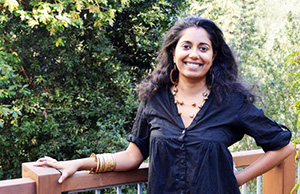Melissa De Witte, UC Santa Cruz
As the world deals with the aftermath of the Islamic terror attack on the French satirical magazine Charlie Hebdo, UC Santa Cruz anthropology professor Mayanthi Fernando’s new book, 'The Republic Unsettled: Muslim French and the Contradictions of Secularism,' (Duke University Press, 2014) provides insight to understanding Islamic culture and secularism in contemporary France.
Fernando combines ethnographic observations with political analysis to illustrate that secularism or laïcité — what the French call the political separation of church and state — is far from a neutral concept. Fernando shows how French Muslims carry the burden of secularism’s contradictions.
Laïqué republic

Credit: Melissa De Witte
In 1905, France was constitutionally declared to be a laïqué republic, a country where religion and politics are fully separate. The law includes that no government organization (including public schools) can promote religious dogma of any kind. Communal prayers, religious assemblies or crosses on walls are not allowed in government buildings or schools. More recently in 2004, even wearing conspicuous religious symbols in public schools was forbidden: no Christian crosses, Jewish yarmulkes, or Muslim headscarves and veils.
Fernando shows that while Christian or Jewish garb was banned but often tolerated in public schools, the Muslim headscarf was deemed as an assault to French identity. It represented an attack on feminism, a symbol of submission and foreignness. She describes how the debate reassigned Islamic faith into immigrant Arab and North African categories, thus loading it with racial and xenophobic connotations. Instead of just being freedom of religion, laïcité has come to be used as a political tool representing freedom from the alien, foreign and the “un-French.”
In an era defined by globalization and an international flow of ideas, information and people, the French political and media elite perceive laïcité as under threat. As Fernando shows, laïcité requires a continual political renewal by the state. She writes: “Secularism is a historically evolving, normative project of government that entails the administrative intervention into and transformation of what are called, retroactively, religious traditions, institutions and sensibilities.”
This government intervention makes laïcité inherently contradictory, Fernando says. How can there be separation of church and state when the government is always intervening in religious affairs? And who is the government intervening against? And adding to the complexity of the problem, what is the ideal, when laïcité has always disproportionately favored the Christian majority?
Regionally exempt from laïcité
Fernando points to the Alsace-Moselle region, an area exempt from laïcité altogether. The region officially recognizes Catholicism, Calvinism, Lutheranism, and Judaism and even uses government funds to pay for religious education and clergy. But when Muslims demand equal treatment, they are accused of thinking too much like Muslims and not enough like French citizens. Fernando wrote an opinion article "The French Myth of Secularism" for the online site The Conversation about this dynamic in light of the Charlie Hebdo attack).
Fernando complements her deep theoretical exploration with her own experience of living in the country as a teacher. She draws on conversations with her Muslim students, many of them the children of immigrants, who share their personal struggle of wearing the hijab in public.
By journeying into the secular life and conversing in intimate and everyday spaces, Fernando is able to tease out the disruption, the “unsettling” of the French Republic. By taking Muslim and secular life seriously, Fernando’s book is as much a study on national identity and French politics as it about Muslim French.
Fernando is organizing a public lecture series at UC Santa Cruz in April and May on sex and religion in American politics and culture.

